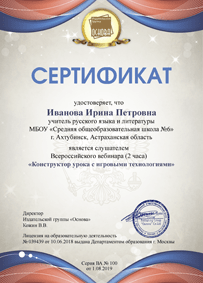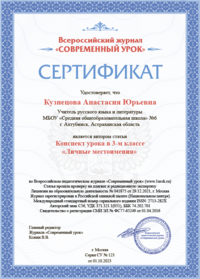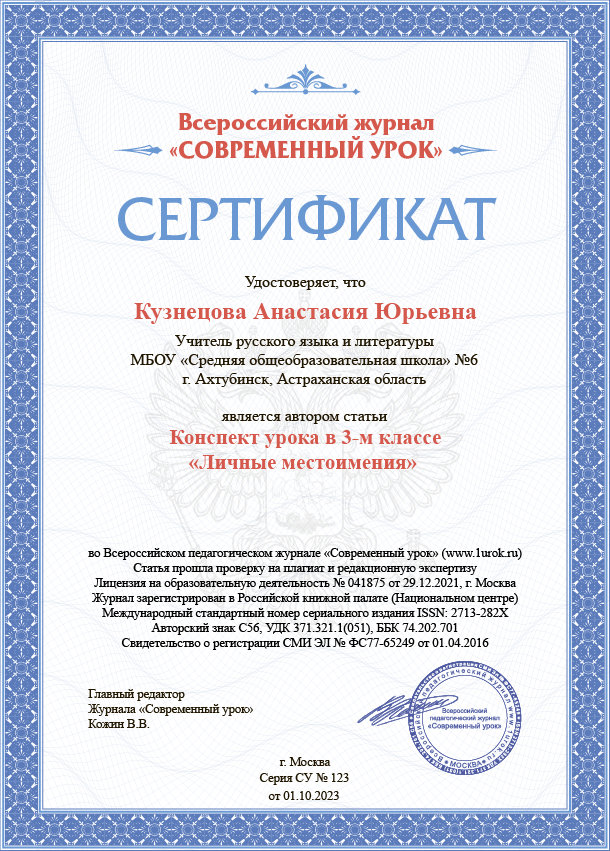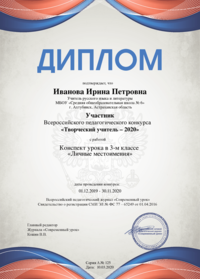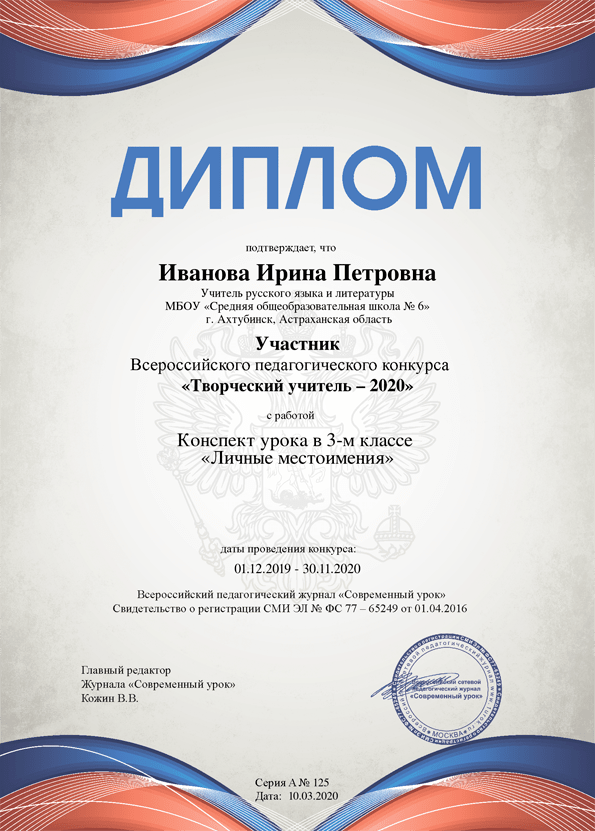Разработка урока английского языка «Экологические проблемы. Погода»
Автор: Курилова Алла Александровна
Организация: ГОУ ЛНР «Свердловский лицей №1»
Населенный пункт: Луганская Народная Республика, г. Свердловск
ПЛАН-КОНСПЕКТ УРОКА
Тема: Экологические проблемы. Погода.
Цели:
Учебные: активизировать употребление лексико-грамматического материала по теме; совершенствовать навыки диалогической речи; обучать аудированию с использованием видеофрагмента; ознакомить с новыми идиомами.
Развивающие: развивать навыки устной речи, аудирования, письма; иноязычную коммуникативную компетенцию обучающихся; социокультурную компетенцию обучающихся, активность, способность к анализу, обобщению и формированию собственных выводов, навыки логического и последовательного оформления своих мыслей на английском языке, зрительную, долговременную и оперативную память, языковую догадку.
Воспитательные: формировать гражданскуюкомпетенцию учащихся и активную позиции по отношению к защите окружающей среды; воспитывать чувство сострадания, толерантности, взаимопомощи.
Формы работы: фронтальная, парная, индивидуальная.
Методы и приёмы работы: организационные методы, коммуникативный метод, аудиовизуальный метод, диалог; приёмы технологии развития критического мышления:мозговой штурм,”fishbone”, кластер.
Оборудование:
компьютер, мультимедийный проектор, экран, презентация урока, запись видео фрагмента, видеоклип и аудиозапись к песне Майкла Джексона “Earth Song”, раздаточный дидактический материал, компьютерные презентации проектов обучающихся.
Список используемой литературы
Учебник по английскому языку за 8 класс: УМК Spotlight 8. Английский в фокусе Ваулина Ю.Е.)
Рабочая тетрадь к Учебнику по английскому языку за 8 класс: УМК Spotlight 8. Английский в фокусе Ваулина Ю.Е.)
Ю. Голицынский Грамматика
R. Murphy English Grammar in Use
V. Evans Round Up 5
Ход урока
- Начало урока
- Оргмомент. Приветствие. Сообщение темы и целей урока.
Teacher: Good morning, boys and girls! Today we have some guests at the lesson. We greet our guests. We are glad to see you. I hope you are fineand ready to work hard and enthusiastically. Today we have our lesson on the topic “Ecological Problems.
WEATHER”.
It’s a wonderful world we live in. It is our Earth. For thousands of years the Earth has given support to all forms of life – human beings, animals, birds, fish, insects and plants. But now people all over the world think about our planet. They say our planet is in danger.
Our planet is in trouble.
We hear it every day.
And yet, we all continue
To throw it all away.
We’re threatening our future,
Endangering our lives.
If we don’t take some action,
Our planet won’t survive.
We have very serious environmental problems on our Earth.
Who can say what these problems are?
P1: One of the problems is air pollution.
P2: I think the next global problem is water pollution.
P3: A lot of animals, birds and plants are disappearing now. To my mind, it’s a very serious problem.
P4: Another problem is overpopulation. Nowadays there are too many people on the Earth, so the pollution of it becomes higher and higher.
P5: And we have also such a problem as destruction of natural resources. For example, every year more and more trees are cut down.
T: You are quite right. At this lesson we are going to discuss global environmental problems, natural disastersandwe will try to answer the question: “What can we do to protect our environment and to save our precious planet?”
During the lesson you’ll: (слайд 3)
- discuss some questions on the topic;
- get some new information;
- work in groups;
- do some tasks;
- do the projects;
- express your ideas on the topic;
- develop your listening and reading skills.
Motivation (слайд 4)
After the lesson you’ll be able to
- speak about different environmental problems and the ways of their solving;
- know what we can do to save our planet ;
- discuss different weather conditions;
- understand how it is important to live in harmony with nature;
- do everything you can to avoid the pollution on the local and global levels.
Warming up
Video “Introduction to Environmental Issues”
Let’s have the following words as the slogan of our lesson:“The environment is not as “cheap as chips” , it is priceless and we all have a part to play in protecting it”.(слайд 5)
- Основная часть урока
- Активизациялексикипотеме “ENVIRONMENT. Natural Disasters”
Let’s start with revising the vocabulary on the theme.
- T. The problem of the planet destruction is urgent! The relationships between Man and Nature are complicated. According to his attitude to nature a man can be a Creator and a Destroyer. It is important to find a balance between people and Nature.
Global warming, killing animals, plant trees, nuclear pollution, poison, nature parks, air pollution, rubbish, put filters, acid rains, ozone layer, create zoos, noise pollution, love nature, overpopulation, reduce pollution, feed animals, recycling, cut down trees, water pollution, radiation, use solar and wind energy, save resources, reuse water.
The group gets a set of “ecological words”. You should find the words which belong to the section “Man, the creator” and choose the words which describe “Man, the destroyer”.
Use the words you choose to complete the chart. (слайд 6)
|
ManandNature |
|||
|
. .. |
|
' |
|
|
Man, theCreator |
Man, theDestroyer |
||
- And now let’s speak about different environmental problems:(слайд 7-8)
- to pollute the environment
- to cut down forests
- without water or food
- toxic waste
- to pour into the rivers
- dangerous to breathe
- a town dump
- floods and drought
- endangered species
- greenhouse gases
- to save energy
3) Now look at the pictures and name the most serious ecological problems: (слайд 9)
Littering, war conflicts, air, water and land pollution, endangered animals, drought, cutting down forests, animal killing, global warming.
-Let’s make some tips about what we should and shouldn’t do to save our world.
-Which of this tips do you use in your life?
- Развитие аудитивного навыка.
Now I offer you to watch a video, called “Save our world”. You will work with the scheme “fishbone”. (слайд 10)
Before listening.But before let’s discuss it. Look at the head of the fish and state the main problem of the film.
-You have got key words to complete the “fishbone”.
While listening. While watching complete the “fishbone” with the facts from the video. Write only key words. (Приложение 1)
-Watching the film.
Follow-up activities.Discussing the ways of solving ecological problems after watching the film.
-What conclusion can you come to?
- Работа в группах. Защита проектов. Развитие навыков монологической и диалогической речи учащихся.
- Выполнение лексических упражнений
(СЛАЙДЫ 11-17)
TEACHER.We’ve done lexical, listening and reading tasks and now I think our groups are ready to present their ideas concerning different natural disasters.
Imagine that you are some Green organization activists. You had the task to design projects telling people about ecological problems of the day. Are you ready?
Now introduce your groupand tell what natural disaster do you want to attract our attention to?
The first group is welcome.
The representatives of other groups be ready to add something on the problem or ask some questions.
GROUP I- EARTHQUAKE
GROUP II – TORNADO
GROUP III – FLOOD
GROUP IV - TSUNAMI
T: It was very interesting to listen to all of you. You have done very informative projects. You were active in asking questions.
Thank you very much. You are tired a bit, aren’t you? Why not relax a little? I hope you’ll enjoy listening to wonderful music.
- Аудирование.Музыкальная пауза.
Many people in the world try to do as much as possible to save our planet. One of them was a world famous American pop-singer Michael Jackson. Listen to “Earth Song” devoted to the global environmental problems written by him.
On the desks you have worksheets with lyrics of this song. But there are gaps in them. While listening you have to write down themissed words.
(Pupils listen to the first part of the song, fill in the gaps. Then they check up their answers on the screen.)(слайд 20-21)
Listen to the song by Michael Jackson and fill in the gaps
EARTH SONG
What about1_______,
What about 2_______
What about all the 3________
That you said we were to gain...
What about 4__________fields,
Is there a 5________
What about all the things
That you said was yours and mine...
Did you ever 6_______to notice
All the 7_________we’ve shed before
Did you ever stop to notice
The 8___________Earth, the weeping shores?
What environmental problems have you seen in the video clip?
- Deforestation as a result of cutting and forest fires;
- Killing animals by poachers;
- Wars;
- Industrial pollutions.
- Активизация лексики по теме погода(слайд 22-24)
There is one more part of our life which is connected with environment. Look at the slide and say what it is. It is weather. What associations do you have when you hear this word?
Exercise 1, 2, 3, page 47 (WORKBOOK)
- LISTENING, READING and SPEAKING TASKS
Exercise 3 page 80 ( textbook)
DIALOGUES about weather in different seasons
Use word combinations and make up dialogues
Autumn weather GROUP I
Winter weather GROUP II
Spring weather GROUP III
Summer weatherGROUP IV
- Ознакомление с новыми идиомами. Выполнение тренировочных упражнений
Слайды 26-28
There are some idioms in English which are connected with the theme of weather. Look at the pictures, read them and guess about their meaning.
1.to feel under the weather- to be or feel ill
2.to save up for a rainy day-to keep some money for a time in
the future when it might be needed
3.to be on cloud nine -to be very happy
4.to see which way the wind blows-
to see how a situation is developing
5.to be a bolt from the blue -to be a great surprise
Complete the sentences with the idioms.
1. "Was Helen happy about buying a new car?" “Happy? She was on __________!“
2. The news of his marriage was a _____________.
3. He is feeling _____________so he is going to bed early tonight.
4.Let's see which way the ___________ before we decide.
5.She has a thousand pounds which she's saving for a _____.
Слайд 29
Exercise 4, page 47 (WORKBOOK)
III.Конецурока
- Подведение итогов урока
SUMMARY
Let’s see if we have gained our aims. (Slide)
- Can you speak about different environmental problems and the ways of their solving?
- Do you know what we can do to save our planet?
- Do you understand now how it is important to live in harmony with nature?
- Will you do everything you can to avoid the pollution on the local and global levels?(СЛАЙД 30)
- Оценивание деятельности учащихся
EVALUATION SHEETS (Приложение)СЛАЙД 32
Now fill in your evaluation sheets.
- Рефлексия
Let’s discuss our lesson. Tell me:
what was difficult/interesting;
what you know now; what you can do now.СЛАЙД 33
It’s high time to finish our lesson.
Your h/t: Learn the idioms, Ex. 7 p.81СЛАЙД 34
Today we have tried to summarize our knowledge on the topic “Environmental Problems” and to find out some ways how to save our precious planet Earth. Summing it up, I want you to stick the leaves to the green tree with green rules of saving the Earth. You are welcome.
- The world is our home and we want to see it clean and beautiful.
- Clean air and healthy life everywhere.
- Be creative! Look for opportunities to reduce trash!
- Make sure your water faucets are turned off when you are not using them!
- We should think about all these ecological problems if we want to survive!
- We all must work together to make our planet a safe and beautiful place to live!
- Open national parks for animals, birds, trees and plants.
- We should build purification plants.
- People started pollution. People can stop it.
- We must live in harmony with nature.
- Hunting rare animals must be forbidden.
- Don’t wash your cars near the rivers or ponds.
- Don’t leave litter in the forest.
- Don’t make fires in the forests.
- Turn off the light when you leave the room.
- Don’t kill animals.
- Pick up litter.
- Don’t destroy nature.
Во время песни (SongSheet 3) учащиеся подходят к рисунку «зеленого дерева» и прикрепляют к нему листики с «зелеными правилами» защиты окружающей среды.
Conclusion(Slide 35, 36)
I think our lesson was useful for you. I want you to remember everything we have talked about because it is our duty to do everything tosave our planet. I want you remember the wise advice of a great English writer John Galsworthy who said:
“IF YOU DON’T THINK ABOUT THE FUTURE YOU WILL NOT HAVE IT”.
Let’s save our fragile planet for future generation.
Think green to save our precious planet.
Thank you for your work at the lesson. See you.
Полный текст статьи см. в приложении.

